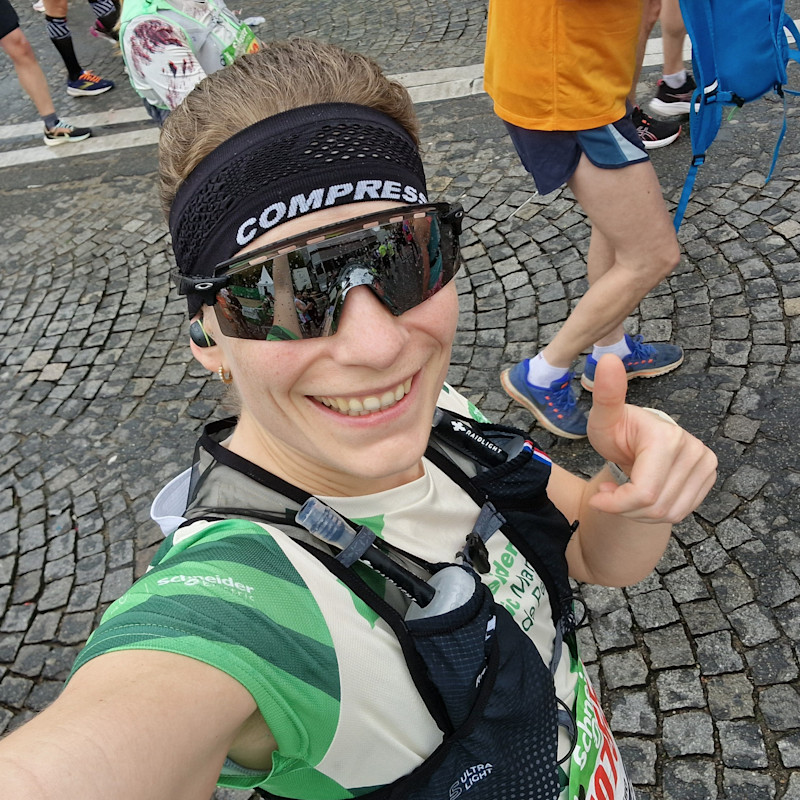
Fine Bussing
Düsseldorf Marathon
Fine's headline numbers
Fine's strategy
Fueling
Carbohydrate is the main fuel you burn when racing. Failing to fuel properly is a leading cause of underperformance in longer races.
In her two previous marathon attempts, Fine had only taken on a couple of gels during the whole race. This time, with the help of our Sports Science Team, Fine built a more structured, science-backed strategy that she practised in training and executed on race day. By taking a 30g carb dose in the form of a PF 30 Gel every 30 minutes, she met the 60g/h recommendation for a marathon of this duration. Rather than only consuming fuel at various distance markers during the race, the 30-minute intervals provided Fine a consistent stream of carb, keeping her energy levels up throughout. Looking ahead to future races, Fine may benefit from optimising her pre-race fueling, including her carb load in the days before and breakfast on race morning, to meet the scientific guidelines and support an even stronger performance.
Hydration
Taking on board an appropriate amount of fluid and sodium is essential to maintaining blood volume and supporting the cardiovascular effort needed to perform on race day.
Whilst the absolute amount of sodium and fluid consumed per hour is important, it’s critical to consider these in relation to each other. This is known as 'relative sodium concentration' and it’s expressed in milligrams per litre (mg/L). How much sodium you’re taking in per litre of fluid is more important than the absolute amount taken in per hour.
After experimenting with different methods and timings of her hydration and fueling in training, Fine settled on using a hydration vest to carry two 350ml soft flasks of plain water. At halfway, she refilled both flasks at an aid station, allowing her to stay self-sufficient while keeping the weight manageable across the 42.2km. Drawing on experience from past marathons, triathlons, and practise during training sessions, she showed good awareness of her sweat losses and how much dehydration she can tolerate, striking a smart balance between carrying enough and avoiding over- or under-drinking. She also used a structured but simple plan for her sodium intake, taking one Electrolyte Capsule every 45 minutes. Combined with her fluid intake, she consumed a relative sodium concentration close to 900mg/L, which proactively met her needs, supported fluid retention and helped her avoid cramping.
Caffeine
Beyond the Three Levers of Performance (carb, sodium and fluid), caffeine is one of only a few substances that is proven to improve performance for most endurance athletes as it can help stave off mental and physical fatigue.
Fine began race day with a cup of coffee and then took one PF 30 Caffeine Gel 30 minutes into the marathon. This gave her a total caffeine intake of ~100mg (1.6mg/kg), which is lower than the recommended 3–6mg/kg range for endurance performance. While her use of caffeine was conservative, it was well timed to help maintain alertness throughout the middle of the race. With no negative side effects, Fine may consider experimenting with a higher intake in future races to see if she can maximise the ergogenic benefits of the stimulant, especially in longer events.
How Fine hit her numbers
Here's everything that Fine ate and drank on the day...
Fine's weapons of choice
Final thoughts
Fine's full stats
Data Confidence?
There is good confidence in the accuracy of the data reported. An athlete feels that the numbers closely reflect what they consumed despite a couple of estimations which may carry some degree of error. The majority of what was consumed is recorded to a high level of specificity (most volumes are known through the use of bottles brands quantities flavours). The numbers are very plausible and align with previous data recordings (if an athlete has collected data previously).